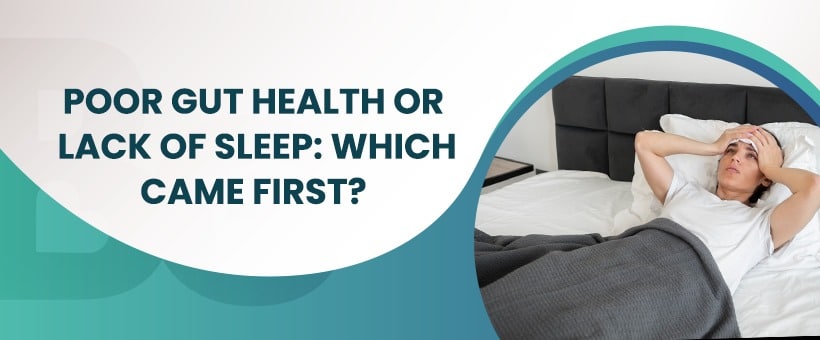Poor Gut Health or Lack of Sleep: Which Came First?

The relationship between gut health and sleep has always been a complicated and controversial one. While both are interlinked, they do follow the classic comparison of the “chicken or the egg” dilemma. Understanding what came first and what led to the other is challenging, knowing that both coexist and impact each other.
This blog aims to delve deeper into the gut-sleep connection and how one exacerbates the other.
The gut microbiota comprises trillions of bacteria that play a crucial role in your body’s normal functions. This includes digestion, cardiovascular function, and immune response. Researchers have found that the gut microbiota has the capability to influence sleep patterns through the gut-brain axis, a bidirectional communication system between the gut and the central nervous system.
When you sleep, your body goes through various restorative processes, including hormone regulation and immune function. These processes are important for maintaining a healthy gut. However, when you lack sleep or your sleep is disrupted for any reason, it can imbalance your gut bacteria, causing gastrointestinal issues and inflammation.
So, the influence of gut health and lack of sleep is cyclic, and they are codependent, making the impact severe and challenging to overcome.
If you suffer from poor gut health, it can lead to inflammation, which in turn affects the brain and disrupts sleep patterns. Moreover, your gut produces a neurotransmitter, serotonin, that regulates mood and sleep. An unhealthy gut leads to reduced serotonin production, thus causing sleep disorders. In addition to this, issues such as bloating, gas, or irritable bowel syndrome (IBS) may cause discomfort and pain, making it difficult for you to have a balanced sleep.
Similarly, lack of sleep can increase cortisol, the primary stress hormone that negatively impacts gut health and may also cause a leaky gut. It is a condition in which your intestines become permeable to toxins, which leak into your bloodstream. Sleep deprivation also weakens the immune system and alters eating habits, causing you to consume more sugary or high-fat food items, thus further exacerbating digestive issues.
Breaking the Cycle of Poor Gut Health and Lack of Sleep
While the chicken or egg situation with gut and sleep is complex and challenging to break, you can incorporate some diet and lifestyle changes that can help you achieve a healthy gut and balanced sleep. Moreover, you can also consider including gut detox products or gut health supplements such as probiotics to break the vicious cycle and promote a healthier life.
“The above article is not to be used as medical advice or recommendations. Please speak with your doctor if you have any queries related to your health.”




